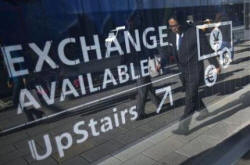|
 Yen
gains in choppy trading, euro on defensive Yen
gains in choppy trading, euro on defensive
 Send a link to a friend
Send a link to a friend
[December 15, 2014]
By Jamie McGeever and Patrick Graham
LONDON (Reuters - The yen inched higher on
Monday as financial markets shrugged off Japanese Prime Minister Shinzo
Abe's election win, while the prospect of falling European inflation
kept the euro on the defensive.
|
|
 Japan's Nikkei stock average <.N225> fell 1.6 percent. Many
investors, particularly foreigners, sell the yen to hedge equities
positions, so the Japanese currency tends to feel upward pressure
whenever stocks slip. Japan's Nikkei stock average <.N225> fell 1.6 percent. Many
investors, particularly foreigners, sell the yen to hedge equities
positions, so the Japanese currency tends to feel upward pressure
whenever stocks slip.
But a victory for Abe's coalition in Sunday's general election was a
boost for his reflationary economic policies, which are likely to
weigh on the yen in the long term.
"The market was expecting this (Abe's victory) to support stocks and
dollar/yen ... However, it seems like this is more of an early
morning shakeout," said Josh O'Byrne, G10 currency strategist at
Citi in London.
The yen handed back some of its gains in morning trade in Europe but
was still 0.1 percent higher on the day against the dollar at 118.75
<JPY=EBS>

The euro fell against both the dollar and yen after European Central
Bank policymaker Ewald Nowotny said euro zone inflation would fall
further in the first quarter. The Bundesbank said plunging oil
prices meant it would probably need to cut its forecasts for
inflation and the ECB's favored measure of inflation expectations
fell further.
That all strengthened the growing conviction that the ECB will have
to start outright purchases of government bonds in the first quarter
to raise the number of euros in circulation.
"It is a messy pre-Christmas market but the euro still looks weak.
All of these policy messages are in there," said one London-based
dealer. He also said there had been hedge fund sales of sterling,
down a third of percent at $1.5665.
A 40 percent fall in oil prices this year is reverberating across a
number of emerging and developed economies. Norway's crown sank to a
six-year low of 9.2130 crowns. <EURNOK=>
[to top of second column] |

The drop <LCOc1> <CLc1> also makes it harder for the ECB to lift
inflation - currently 0.3 percent - back to its target of just below
2 percent. Five-year/five-year forwards, the ECB's preferred measure
of inflation expectations, fell to a new low of 1.69 percent.
The main focus for currency markets this week will be the Federal
Reserve's last policy meeting of 2014, ending on Wednesday. Fed
chief Janet Yellen is expected to avoid any sign interest rates will
rise too soon. The U.S. economy may be doing relatively well, but
weakness in the euro zone, Japan and China adds to the risk of a
U.S. slowdown.
"There's a focus on the Fed – the market is thinking about oil, but
the medium term will be more dependent on monetary policy and not
market volatility. Into year-end though, there is some incentive to
close positions and perhaps there is a shorter threshold for pain,"
Citi's O'Byrne said.
(Additional reporting by Tomo Uetake in Tokyo and Ian Chua in
Sydney; Editing by Tom Heneghan and John Stonestreet)
[© 2014 Thomson Reuters. All rights
reserved.] Copyright 2014 Reuters. All rights reserved. This material may not be published,
broadcast, rewritten or redistributed.
 |